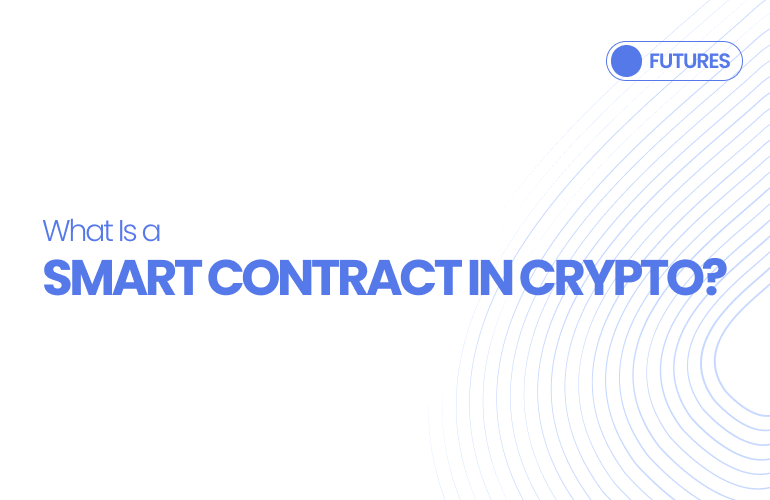In crypto, smart contracts are self-executing programs that automatically enforce rules and move digital assets once predefined conditions are met. They remove the need for a central intermediary and rely on a decentralised network to validate and apply outcomes.
At a glance, a blockchain is a shared, append-only ledger run by many nodes. When code is deployed to a smart contract blockchain like Ethereum, every validating node runs the same logic to reach the same result; users typically pay a “gas” fee to execute transactions.
What is a Smart Contract?
If you’ve ever searched “what is smart contract”, think of it as a digital vending machine: put in the right inputs, and the program releases the output, without manual intervention. Understanding smart contracts helps traders and builders grasp how on-chain apps (DeFi, NFTs, games) automate trust and settlement.
How Do Smart Contracts Work?
A developer writes code, deploys it to a chain (e.g., an EVM network), and users interact with its public functions. Because code on chain is immutable by default, upgrades require careful patterns or redeployment, great for tamper-resistance, challenging for patches. When on-chain logic needs real-world data (prices, weather, identity), it relies on oracles: secure bridges that feed external data into on-chain execution. Hybrid architectures combine deterministic on-chain logic with off-chain computation and data to expand what these programs can do.
Pros and Cons of Smart Contracts
Like any technology, smart contracts come with strengths and weaknesses. Evaluating both sides offers a balanced view and helps in making informed decisions about their adoption.
Pros of Smart Contracts
- Automation & trust minimisation: smart contracts execute rules automatically, reducing counterparty risk and manual ops.
- Transparency & auditability: smart contracts are open to inspection; anyone can review the logic and state changes.
- Composability: On-chain apps plug into one another like APIs, enabling rapid innovation across DeFi and NFTs.
- Lower coordination costs: Less paperwork and fewer intermediaries can mean faster settlement and simpler workflows.
Cons of Smart Contracts
- Immutability trade-offs: Once deployed, smart contracts can’t be easily changed; bugs can be costly without a robust upgrade design.
- Oracle risk: Smart contracts that depend on off-chain data inherit the reliability of their data sources.
- Security complexity: Vulnerable code (re-entrancy, access control mistakes) can be exploited; audits and battle-testing are vital.
- Fees & congestion: High network usage can raise transaction costs and slow execution at peak times.
Use Cases of Smart Contracts
Smart contracts are versatile tools that extend far beyond basic financial transfers. They power applications across industries, from finance to gaming, by embedding trust and automation directly into digital systems.
Smart Contracts in DeFi (Decentralised Finance)
DeFi protocols run core money functions, lending, swapping, liquidity provision, through smart contracts that hold funds and enforce rules transparently. If you trade or hedge directional exposure, Pi42 lets Indian traders access INR-margined crypto futures with direct INR deposit, trade, and withdrawal, useful alongside on-chain strategies. (If you’re exploring contract trading, review the basics first.)
Smart Contracts in NFTs (Non-Fungible Tokens)
NFTs use smart contracts to mint unique tokens, enforce creator royalties (where supported), and prove provenance/ownership across marketplaces and wallets.
Smart Contracts in Supply Chain Management
Track-and-trace flows can encode rules for hand-offs, compliance proofs, and conditional payments; smart contracts commit milestones to a tamper-resistant ledger for shared visibility.
Smart Contracts in Gaming and Digital Ownership
Games issue on-chain assets and enable verifiable scarcity. Players can trade items peer-to-peer, and titles can integrate external data via oracle frameworks to unlock richer mechanics.
Smart Contracts vs Traditional Contracts: Key Differences
To appreciate the disruptive role of smart contracts, it’s useful to contrast them with traditional legal agreements. The table below highlights the fundamental differences in execution, trust, and transparency.
Need For Crypto Smart Contracts
From “crypto smart contracts” powering DeFi to NFTs and supply chains, these building blocks have shifted how value and rules travel online. For traders in India, Pi42’s INR-margined futures exchange offers familiar rupee rails to express views or hedge positions linked to on-chain markets, while you learn, test, and scale responsibly. As you deepen your practice, keep security hygiene, oracle assumptions, and upgrade paths front-of-mind, and always validate sources before deploying or interacting with critical code.

